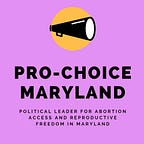Trouble finding EC in Maryland
By Emma Kaufman, Policy Research Intern
In July of 2017, NARAL Pro-Choice Maryland published a report entitled, “What’s Your ‘Plan C’ When You Can’t Get Plan B?”. The report examined 30% of all Maryland pharmacies that could potentially carry emergency contraception (EC). The study utilized secret shoppers and focused on the barriers to access those shoppers experienced when attempting to obtain EC. There were three main barriers listed in the study’s conclusion: age restrictions preventing individuals from obtaining EC, improper placement in stores making the EC more difficult to find, and high costs of the medication. NARAL offered a number of recommendations to help remedy the access issue, including suggesting that all pharmacies take measures to prepare for the passage of the Maryland Contraceptive Equity Act in January 2018.
The key question was whether or not pharmacies would follow the mandate of the legislation and accept insurance from individuals seeking to purchase EC.
When the law went into effect, Maryland became the first state in the US to legally eliminate the majority of the barriers men and women face when trying to access birth control. One of the most important aspects of the law mandated that over-the-counter emergency contraception (EC) be covered by insurance providers participating in the Maryland Health Connection insurance exchange program, or Medicaid. The key question, as predicted by the NARAL report, was whether or not pharmacies would follow the mandate of the legislation and accept insurance from individuals seeking to purchase EC.
I began my internship at NARAL Pro Choice MD on May 28, 2019. On May 29, I found myself in the field, working on a project examining the success of the Maryland Contraceptive Equity Act. Specifically, I was tasked with investigating if there had been any improvements in obtaining birth control from pharmacies labelled by the original NARAL study as making EC “somewhat difficult” or “very difficult” to obtain. I spent three days visiting pharmacies in Montgomery County, Prince George’s County, and Howard County. I traveled to parts of Maryland that I, a lifelong Marylander, had never been before. My experience was enlightening and I took away three major lessons.
First, I realized that the likelihood that EC would be available in a pharmacy, in an unlocked box, on the shelf and available for purchase, was directly connected to how wealthy the surrounding area was. Chain grocery store pharmacies that I visited in Montgomery County almost all had both brand name and generic contraception freely available for purchase on the shelf. By contrast, the chain grocery store pharmacies I visited in Howard and Prince George’s never had any type of EC, in either a locked or unlocked box, on the shelf. Instead, I had to go to the pharmacy section of the store to request EC. When I asked some pharmacists why they did not have any EC available on the shelf, they told me that the EC was often stolen off the shelf. To remedy this issue, the pharmacists had begun stocking the medication behind the pharmacy counter.
There has been a communication breakdown, resulting in some of the most vulnerable populations in Maryland forced to bear the brunt of this error.
Second, I learned that pharmacists are completely unaware that EC is now covered by insurance and that no prescription is needed to obtain the medication. I asked multiple pharmacists if they would accept my insurance and all of them asked to see a prescription from my physician. When I told them about the Contraception Equity Act, I was met with blank stares. More training and raising awareness about the new law is needed within the community of Maryland pharmacists. There has been a communication breakdown, resulting in some of the most vulnerable populations in Maryland forced to bear the brunt of this error.
Finally, I was confronted with the complex purchase process, as well as the lack of privacy available to EC purchasers. Only on rare occasions did I find the EC easily, having the option to discreetly pick up an unlocked box of EC off of a shelf in a pharmacy. For the most part, I needed to speak with one, two, or three store employees to locate the EC, ask about the price of the medication, and then ask if I could use my insurance to cover the cost. At times, I first went to the pharmacy to inquire about EC, only to be told to go to the front of the store and ask the cashier to purchase the medication. The process was anything but private. If I were a purchaser that was already feeling uneasy about obtaining EC, the complicated process and lack of discretion in purchasing the medication would only make matters worse.
If cheap, easy, and equitable access to contraception is the ultimate goal, our lawmakers, insurance providers, and pharmacists need to step up their game. We all need to work together to insure that the Maryland Contraceptive Equity Act is successfully implemented and that no further barriers to contraception access exist.
